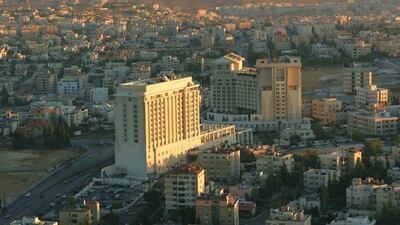Moody’s Investors Service affirmed the Government of Jordan’s long-term issuer and senior unsecured ratings at B1, and maintained a stable outlook on expectations that public debt will decline.
“The stable outlook balances Moody’s view that Jordan’s planned fiscal reforms will set the government’s elevated debt-to-GDP ratio on a gradually declining path in the next few years, against the risk [of] weak growth and high unemployment,” the rating agency said in a report on Friday.
The aforementioned risks could cause delays or partial reversal of the government’s fiscal consolidation strategy, Moody’s added.
The stable outlook reflects better prospects for growth in merchandise exports and tourism receipts due to the improving security situation in Syria and Iraq.
At the same time, higher oil prices and rising global interest rates create external liquidity pressures and balance of payments issues for Jordan and weigh on its overall outlook, the report said.
In June, the UAE, Kuwait and Saudi Arabia extended a $2.5 billion aid package to Jordan to help stabilise its economy amid record debt levels and unemployment, which stands at 18.7 per cent of the population, according to Moody’s.
External debt is at around 72 per cent of GDP, and the country has seen only modest growth, of around 2 per cent in 2017, Moody’s said. Earlier in the year, Jordan suffered its biggest protests in years, prompted by price hikes, subsidy cuts and other fiscal measures taken by the government to reduce debt.
The package from the Arabian Gulf allies includes a deposit to the central bank, annual budget support for five years and a combined $600m in credit guarantees to help Jordan secure World Bank financing for infrastructure projects and other development initiatives.
The decision to affirm Jordan’s B1 ratings, instead of upgrading them, reflects “credit challenges posed by an increasingly adverse global financing and trade environment, in the context of very large current account deficits and declining foreign exchange reserves, and rising domestic social pressures,” Moody’s report said.
However, it noted that the government’s fiscal consolidation measures, international commitment to support Jordan, and reforms of the sovereign’s energy sector and sourcing could reduce its vulnerability to higher oil prices.
__________
Read more:
UAE, Saudi Arabia and Kuwait agree $2.5bn aid package for Jordan
Jordanian king arrives for Saudi's GCC assistance summit
EU assures Jordan of continued aid
_________
A sustained downward trend in the government’s debt burden together with reduced sensitivity to increases in interest rates and a ramp up in regional trade would prompt Moody’s to upgrade the rating.
A faster decline in foreign exchange reserves than anticipated – particularly if it weakened the country’s position and made investors cautious – along with a further deterioration in domestic social pressures and weak growth, would lead to a downgrade. However, Moody’s “expects some further erosion of Jordan’s external buffers”, it said.
Jordan’s country ceilings were unchanged in the report on Friday. The foreign currency bond ceiling remains at Ba1/NP, the foreign currency deposit ceiling at B2, and the long-term local currency bond and deposit ceilings at Ba1.

